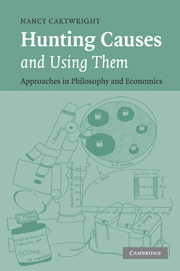Book contents
- Frontmatter
- Contents
- Acknowledgements
- Introduction
- Part I Plurality in causality
- Part II Case studies: Bayes nets and invariance theories
- 5 Preamble
- 6 What is wrong with Bayes nets?
- 7 Modularity: it can – and generally does – fail
- 8 Against modularity, the causal Markov condition and any link between the two: comments on Hausman and Woodward
- 9 From metaphysics to method: comments on manipulability and the causal Markov condition
- 10 Two theorems on invariance and causality
- Part III Causal theories in economics
- Bibliography
- Index
7 - Modularity: it can – and generally does – fail
Published online by Cambridge University Press: 03 December 2009
- Frontmatter
- Contents
- Acknowledgements
- Introduction
- Part I Plurality in causality
- Part II Case studies: Bayes nets and invariance theories
- 5 Preamble
- 6 What is wrong with Bayes nets?
- 7 Modularity: it can – and generally does – fail
- 8 Against modularity, the causal Markov condition and any link between the two: comments on Hausman and Woodward
- 9 From metaphysics to method: comments on manipulability and the causal Markov condition
- 10 Two theorems on invariance and causality
- Part III Causal theories in economics
- Bibliography
- Index
Summary
Introduction
This chapter pursues themes developed in my recent book, The Dappled World: a Study of the Boundaries of Science. The book is a Scotist book – in accord with the viewpoint of Duns Scotus. It extols the particular over the universal, the diverse over the homogeneous and the local over the global. Its central thesis is that in the world that science studies, differences turn out to matter. Correlatively, universal methods and universal theories should be viewed with suspicion. We should look very carefully at their empirical justification before we adopt them.
The topic in the volume where this chapter was first published is causality; I shall defend a particularist view of our subject. Causal systems differ. What is characteristic of one is not characteristic of all and the methods that work for finding out about one need not work for finding out about another. I shall argue this here for one specific characteristic: modularity. Very roughly, a system of causal laws is modular in the sense I shall discuss when each effect in the system has one cause all its own, a cause that causes it but does not cause any other effect in the system. On the face of it this may seem a very special, probably rare, situation. But a number of authors currently writing on causality suppose just the opposite. Modularity, they say, is a universal characteristic of causal systems. I shall argue that they are mistaken.
- Type
- Chapter
- Information
- Hunting Causes and Using ThemApproaches in Philosophy and Economics, pp. 80 - 96Publisher: Cambridge University PressPrint publication year: 2007

